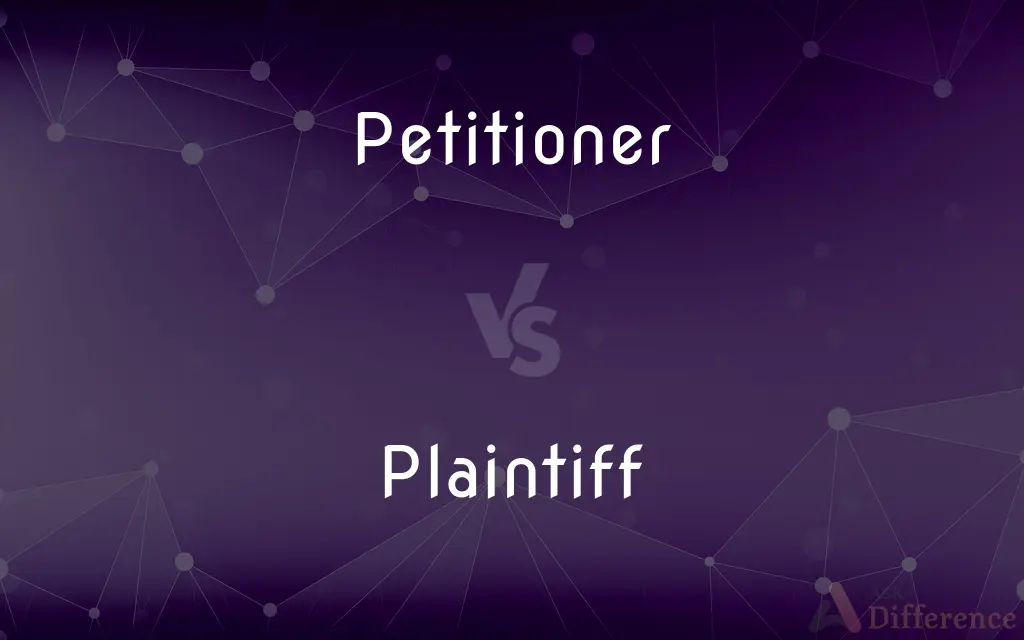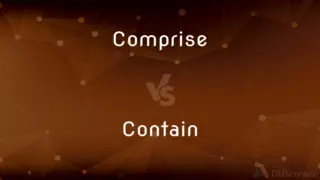Petitioner vs. Plaintiff — What's the Difference?
By Urooj Arif & Maham Liaqat — Updated on March 5, 2024
Petitioner seeks judicial review or relief, while a plaintiff initiates a lawsuit against a defendant.

Difference Between Petitioner and Plaintiff
Table of Contents
ADVERTISEMENT
Key Differences
Petitioner is a term used primarily in legal contexts to refer to someone who presents a petition to a court or other authority in the hope of obtaining some form of judicial relief or remedy. This can occur in various legal scenarios, such as divorce proceedings, petitions for writs, bankruptcy filings, or in appellate cases. Plaintiff, on the other hand, is a term used to describe a person or entity who initiates a lawsuit against another party, known as the defendant, in civil court.
The petitioner asks the court to provide a specific legal solution to a problem or dispute that doesn't necessarily involve a straightforward legal wrong by another party. The plaintiff alleges that they have suffered a loss or injury as a result of the defendant's actions or negligence and seeks compensation or remediation through legal judgment. The nature of the lawsuit can vary widely, from personal injury claims to contract disputes, and the aim is to prove the defendant's liability and obtain damages or specific performance.
The key distinction between a petitioner and a plaintiff lies in the type of legal action they are initiating. A petitioner is often involved in cases where the resolution does not necessarily involve a dispute between two parties over a legal wrong, but rather seeks a legal remedy or decision from the court. In contrast, a plaintiff is always involved in litigation that asserts wrongdoing by the defendant, seeking to establish fault and obtain compensation or other relief directly related to that fault.
While both terms describe parties who are bringing a matter before the court, the specific use of each term helps clarify the nature of the legal proceeding. Petitioners often engage in legal actions that may not be adversarial in nature, such as filing for a change of name or appealing a government agency's decision. Meanwhile, plaintiffs are directly involved in adversarial proceedings, asserting claims against defendants.
Understanding the difference between a petitioner and a plaintiff is crucial for accurately navigating legal documents and proceedings. Each term signifies a different legal pathway and set of expectations regarding the court's role and the desired outcomes of the case. Legal professionals and laypersons alike must use these terms correctly to ensure clear and effective communication within the legal system.
ADVERTISEMENT
Comparison Chart
Definition
Seeks judicial review or relief.
Initiates a lawsuit against a defendant.
Legal Context
Various, including appeals, writs, and non-adversarial cases.
Civil litigation involving a dispute with another party.
Aim
To obtain a legal remedy or decision from the court.
To prove defendant's liability and obtain damages or specific performance.
Nature of Action
Often involves requests for legal changes or appeals.
Involves asserting wrongdoing and seeking compensation.
Examples
Divorce petitions, bankruptcy filings, appellate cases.
Personal injury claims, contract disputes.
Compare with Definitions
Petitioner
A party in family law cases requesting a court's intervention, such as in divorce or custody matters.
The petitioner filed for divorce, citing irreconcilable differences.
Plaintiff
A person claiming to have been injured or harmed and seeking compensation from the responsible party.
The plaintiff filed a personal injury lawsuit after a slip-and-fall accident at a local supermarket.
Petitioner
Someone who formally asks a higher court to review and change the decision of a lower court.
The petitioner appealed the trial court's decision, arguing that it was based on an incorrect interpretation of the law.
Plaintiff
Someone who alleges that their reputation was harmed by false statements and seeks legal remedy.
The plaintiff brought a defamation lawsuit against the publisher for the false accusations made in an article.
Petitioner
A person who applies to the court for a legal remedy or relief.
A petitioner might request a restraining order for personal safety.
Plaintiff
A party alleging breach of contract and seeking enforcement or damages.
The plaintiff claimed the defendant failed to deliver services as agreed upon in the contract.
Petitioner
An individual seeking a specific legal order from a court, often involving protection of rights.
The petitioner sought a writ of habeas corpus to challenge unlawful detention.
Plaintiff
An individual or entity that initiates a lawsuit in civil court seeking redress for a wrong.
The plaintiff sued the construction company for damages resulting from negligence.
Petitioner
A person challenging the decision of a government agency or entity.
The petitioner requested a review of the zoning board's decision denying a building permit.
Plaintiff
A consumer who files a lawsuit against a manufacturer or seller for products or services that are defective, dangerous, or not as advertised.
The plaintiff initiated a class-action lawsuit against the car manufacturer for selling vehicles with a known defect.
Petitioner
A petitioner is a person who pleads with governmental institution for a legal remedy or a redress of grievances, through use of a petition.
Plaintiff
A plaintiff (Π in legal shorthand) is the party who initiates a lawsuit (also known as an action) before a court. By doing so, the plaintiff seeks a legal remedy.
Petitioner
A solemn supplication or request, especially to a superior authority; an entreaty.
Plaintiff
A person who brings a case against another in a court of law
The plaintiff commenced an action for damages
Petitioner
A formal written document requesting a right or benefit from a person or group in authority.
Plaintiff
The party that institutes a suit in a court.
Petitioner
A formal written application seeking a court's intervention and action on a matter
A petition for review of a previous court's decision.
Plaintiff
A party bringing a suit in civil law against a defendant; accuser.
Petitioner
Someone who petitions a court for redress of a grievance or recovery of a right
Plaintiff
A person who brings an action in a court of law
Common Curiosities
In what scenarios would you find a plaintiff?
You would find a plaintiff in civil litigation scenarios where they allege wrongdoing by a defendant and seek to recover damages or obtain specific relief through the court's judgment.
What is a plaintiff?
A plaintiff is a person or entity that files a lawsuit against a defendant in civil court, alleging loss or injury due to the defendant's actions and seeking compensation.
What is a petitioner?
A petitioner is someone who requests judicial review or relief from a court or authority, often in non-adversarial legal actions.
Can the terms petitioner and plaintiff be used interchangeably?
No, these terms are not interchangeable and are used in different legal contexts to indicate the nature of the legal action being taken.
In what type of cases is someone likely to be a petitioner?
Individuals are likely to be petitioners in cases involving legal remedies or decisions that do not necessarily involve a direct legal wrong by another party, such as appellate cases or petitions for legal changes.
Is a plaintiff always involved in an adversarial process?
Yes, by definition, a plaintiff is involved in an adversarial process, asserting claims against a defendant in civil court.
How does the court's role differ in cases involving petitioners vs. plaintiffs?
In cases involving petitioners, the court's role may include reviewing decisions of lower courts or administrative agencies, or granting specific legal remedies. In plaintiff cases, the court adjudicates disputes over alleged wrongs and determines liability and damages.
Does a petitioner always oppose a defendant?
No, petitioners do not always oppose a defendant. In some cases, such as certain family law matters or petitions for relief, the action might not involve an adversarial dispute.
Is the outcome for a petitioner different from that of a plaintiff?
The desired outcomes for petitioners and plaintiffs can vary widely depending on the case, but generally, petitioners seek a court's decision or remedy in non-adversarial contexts, while plaintiffs seek a judgment against a defendant for alleged wrongs, including damages or other relief. The specific relief sought will depend on the nature of the legal action and the applicable law.
Can one party be both a petitioner and a plaintiff?
Yes, depending on the context and nature of legal actions undertaken, one party can act as both a petitioner in one scenario (e.g., an appeal) and a plaintiff in another (e.g., a civil lawsuit).
How does the role of a petitioner differ in administrative law versus civil law?
In administrative law, a petitioner often seeks review of a decision made by a government agency or body, asking a court to alter or reverse the decision based on legal or procedural grounds. In civil law, the role of a petitioner can be similar to that in other non-adversarial legal contexts, such as family law petitions, where the focus is on requesting a legal remedy or decision from a court without a direct adversarial dispute.
What legal strategies might a petitioner or plaintiff use to succeed in their case?
A petitioner's legal strategies might include demonstrating that a decision was incorrect based on legal standards or procedural errors, or that a legal remedy is justified under the circumstances. A plaintiff's strategies will likely focus on proving the defendant's liability through evidence of wrongdoing or negligence and demonstrating the extent of damages or the need for specific relief. Both petitioners and plaintiffs must effectively argue their case based on the relevant law and facts.
What determines whether a legal action requires a petitioner or a plaintiff?
The nature of the legal issue at hand determines whether a legal action requires a petitioner or a plaintiff. If the matter involves seeking a judicial review or decision without a direct adversarial dispute, such as an appeal or a petition for a writ, the initiating party is a petitioner. If the action is a civil lawsuit alleging wrongdoing and seeking damages or specific relief from another party, the initiating party is a plaintiff.
Can a legal case change from requiring a petitioner to a plaintiff, or vice versa?
Typically, the designation of parties as petitioner or plaintiff remains consistent based on the nature of the legal proceeding. However, the same party could be involved in different legal actions under different roles; for example, a person could be a petitioner in an appellate case and later a plaintiff in a related civil lawsuit.
Share Your Discovery

Previous Comparison
Jocularly vs. Jokingly
Next Comparison
Comprise vs. ContainAuthor Spotlight
Written by
Urooj ArifUrooj is a skilled content writer at Ask Difference, known for her exceptional ability to simplify complex topics into engaging and informative content. With a passion for research and a flair for clear, concise writing, she consistently delivers articles that resonate with our diverse audience.
Co-written by
Maham Liaqat













































